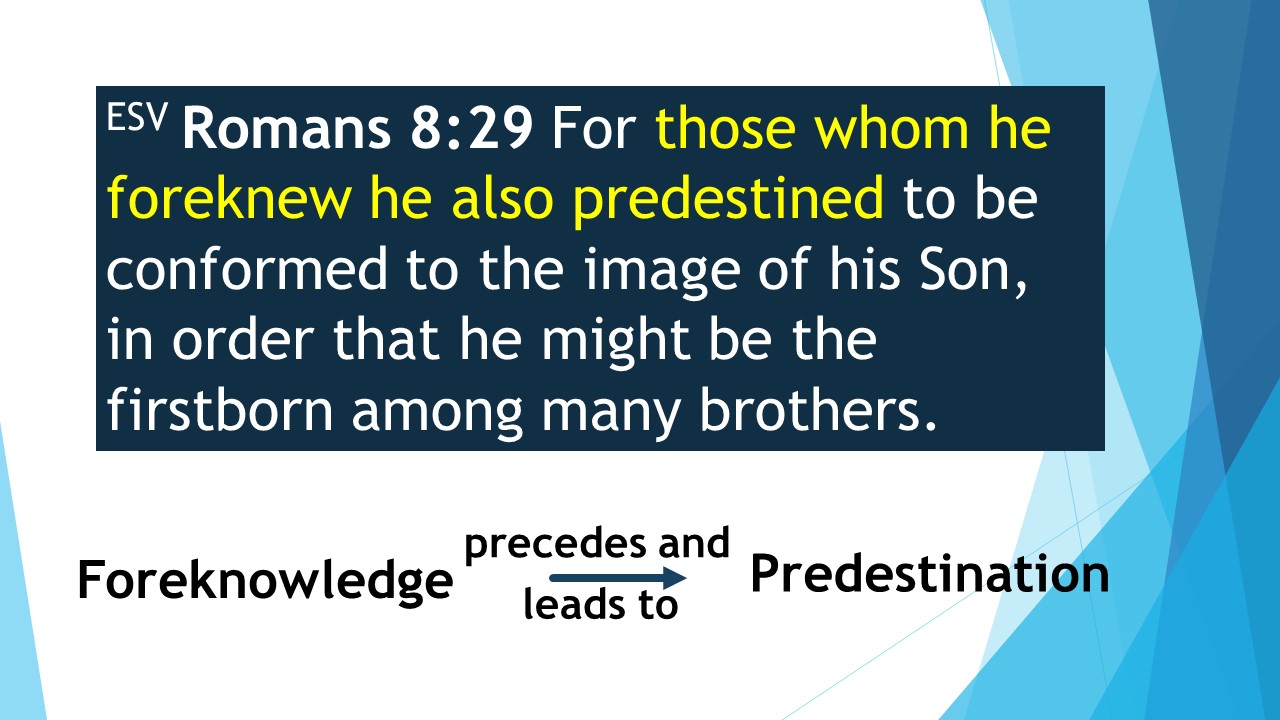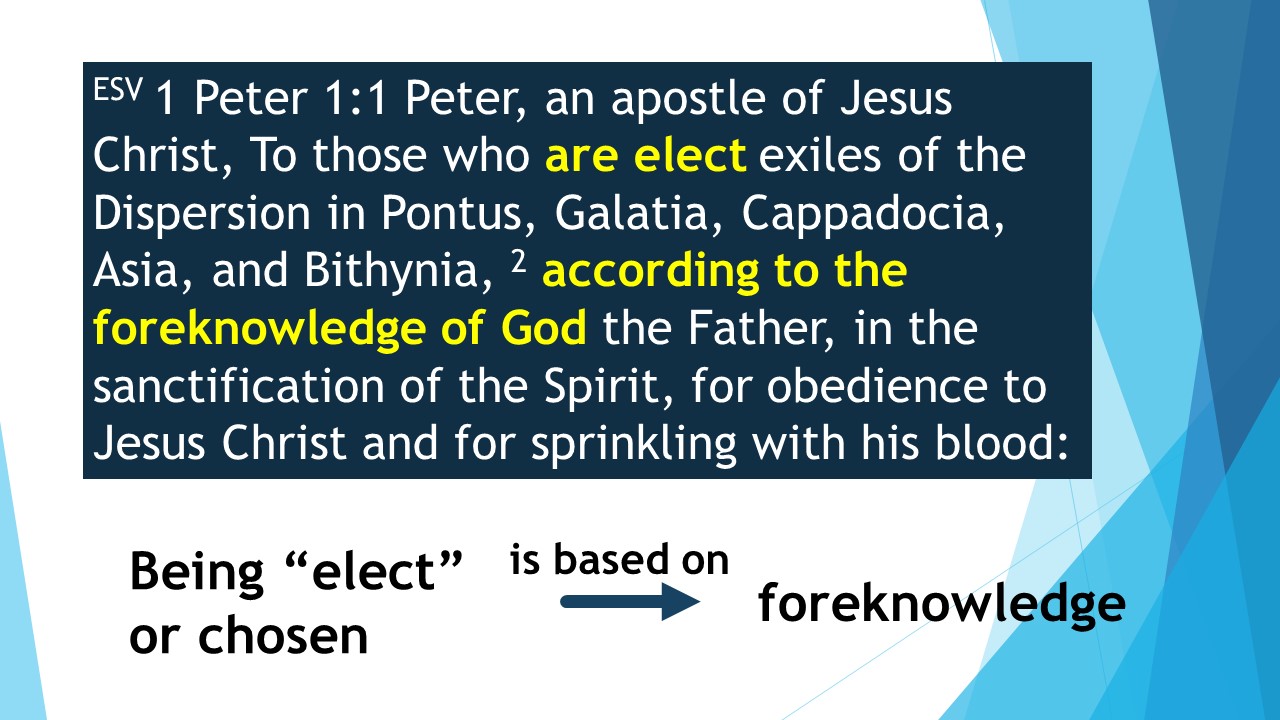As far as I know, the suggestion that God's call preceded foreknowledge and predestination is not a normal view for Reformed theology, Arminian theology, or any other theology. But there are a lot of theologies and variations of theology out there, so I could be wrong.
Grace and Peace, Mark
Which shows, you have not studied what Reformed theology, specifically Calvinism teaches.
Glance, rather, read this.
August Hopkins Strong, Systematic Theology
The Attributes of God, by A.W. Pink, 4. The Foreknowledge of God
"IV. As this theory is just the opposite in every respect of the Calvinistic theory of personal, unconditional, and eternal Election, it is better to put the two in direct contrast, and to proceed to the proof that the Scriptures teach the latter, and not the former.
The latter theory is that God (who and not man is the one who chooses or elects), of his own purpose (in accordance with his will, and not from any obligation to man, nor because of any will of man), has from Eternity (the period of God's action, not in time in which man acts), determined to save (not has actually saved, but simply determined so to do), [and to save (not to confer gospel or church privileges upon),] a definite number of mankind (not the whole race, nor indefinitely merely some of them, nor indefinitely a certain proportionate part; but a definite number), as individuals (not the whole or a part of the race, nor of a nation, nor of a church, nor of a class, as of believers or the pious; but individuals), not for or because of any merit or work of theirs, nor of any value to him of them (not for their good works, nor their holiness, nor excellence, nor their faith, nor their spiritual sanctification, although the choice is to a salvation attained through faith and sanctification; nor their value to him, though their salvation tends greatly to the manifested glory of his grace); but of his own good pleasure (simply because he was pleased so to choose).
This theory, therefore, teaches that election is:
(1.) An act of God, and not the result of the choice of the elect.
(2.) That this choice is one of individuals, and not of classes.
(3.) That it was made without respect to the action of the persons elected.
(4.) By the good pleasure of God.
(5.) According to an eternal purpose.
(6.) That it is an election to salvation and not to outward privileges.
To the Scriptures alone must we look for the truth upon this subject.
Upon opening them we find that the words Election and Elect are used in various senses.
1. They signify a choice to office whether by man or God.
Luke 6:13. Christ's choice of the twelve Apostles.
Acts 1:21-26. The selection of an Apostle in the place of Judas.
Acts 9:15. Saul is called a chosen vessel.
1 Pet. 2:6-8. Christ is spoken of as the corner-stone, elect, precious that is laid in Zion.
2. The choice of Israel to their peculiar national privilege of being the chosen or separated people of God; as in Acts 13:17. "The God of this people Israel chose our fathers."
3. It is once used for a choice made of' salvation by an individual.
Luke 10:42. "Mary hath chosen the good part which shall not be taken away from her."
4. In a large majority of cases it has reference to the choice to salvation, either in the purpose or act of choice by God.
It is to the doctrine taught in this last class of passages that our inquiries are to be turned.
(1.) Election is an act of God, and not the result of the choice of the Elect.
This is not now an inquiry into the reason of Election; but simply into the agent. Does God choose the elect, whether by his own purpose, or because he foresees that they will believe, or for any other reason? Is election an act of God?
The fact on this point would appear more clearly if we were to exchange the common word choice or chosen with the equivalent word elect.
The following passages are sufficient, though the examples are far more numerous.
John 13:18. "I know whom I have chosen."
John 15:16. "Ye did not choose me, but I chose you" (not to their offices as apostle, but), "that ye should go and hear fruit."
Rom. 8:33. "Who shall lay anything to the charge of God's chosen ones?"
Rom. 9:15. "I will have mercy on whom I have mercy."
Eph. 1:4. "Even as he chose us in him."
Eph. 1:11. "Having been foreordained according to the purpose of him who worketh all things after the counsel of his will."
2 Thess. 2:13. "God chose you from the beginning unto salvation."
2. This choice is one of individuals and not of classes.
This position needs to be explained. It is not denied that the Elect are to be true believers, and that true believers are the Elect. The character of the Elect does not, therefore, enter into this question. The issue is simply, does God choose all who shall believe, and are they, as such, his elect? or, does he choose his elect, and will they, as such, believe? Is belief the result of God's election, or is God's election the result of man's faith?
Acts 13:48. "As many as were ordained to eternal life believed." This is a historical statement made subsequent to the event, not by man's knowledge but by inspiration.
Eph. 1:4, 5. "Even as he chose us in him, . . . having foreordained us unto adoption as sons."
2 Thess. 2:13. "But we are bound to give thanks to God alway for you, brethren, beloved of the Lord, for that God chose you from the beginning unto salvation in sanctification of the Spirit and belief of the truth." Here the choice is made to salvation, and the means to salvation, sanctification and faith, are indicated; no prerequisite or means being stated as to Election. It is not as believers that they are elected; but as elected, that they are saved.
Rom. 8:29. "Whom he foreknew he also foreordained to be conformed to the image of his Son." The foreknowledge here is of persons, not of personal acts, not of those whose faith he foreknew, nor, as would be essential to their theory, is it of the class of believers as such. The Arminian theory would require the substitution of the words "as believers" or "you as believers" instead of those which are used.
It is not, therefore, to the class of believers, but to individuals that election refers. But, it may be asked, does it not refer to them in that character? Did not God choose those whose faith he for-saw?
(3.) The third point then to be proved is, that it was not because of any act or merit of theirs, but irrespective of anything but his own good pleasure, that this Election was made.
This is merely a negative form of the same fact stated by the next point affirmatively. It is better, therefore, to unite this with the succeeding one, which is,
(4.) That the election is made through the mere good pleasure of God."
Abstract of Systematic Theology, James P. Boyce, 1858, Chapter 29, Election
So evidently, my first assumption was correct.
God Bless
Till all are one.



